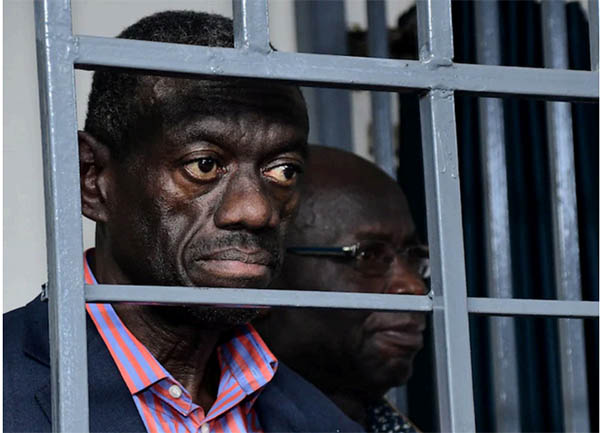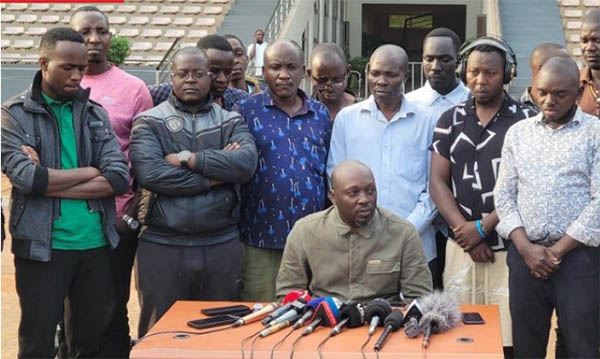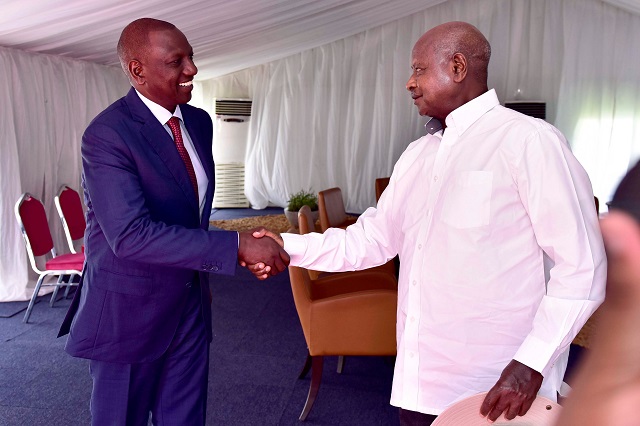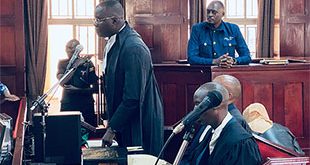
What’s the Ugandan government calculating?
COVER STORY | IAN KATUSIIME | The abduction of opposition figure Dr Kizza Besigye in Nairobi, Kenya has put President Yoweri Museveni and his government in the eye of a diplomatic storm.
But the major prevailing question asked by everyone is: what is the government’s play this time round? Besigye had not given any indication of running in the 2026 elections. He has retreated from the political scene and choosing to post his reflections on social media site X. His breakaway faction from the FDC, the People’s Front for Freedom (PFF), is still finding its feet in a crowded political arena.
There has been wide international condemnation of the incident since the tweet by Besigye’s anguished wife, Winnie Byanyima, a global diplomat, shortly after midnight on Nov. 20 set off alarms.
Byanyima said Besigye had been kidnapped in Nairobi where he had gone to attend a book launch by a fellow opposition figure in Kenya, Martha Karua.
By the time Besigye was brought to the General Court Martial in Kampala to be charged with unlawful possession of firearms, it looked like the perfect case of ‘plus ça change, plus c’est la même chose’ (the more things change, the more they stay the same).
Brian Atuheire, a friend of the veteran politician and a member of his party, says Besigye has advocated for a peaceful change of power all his life and he is stunned by the government’s move. “He has always believed that using guns takes power away from the people. That is why he advocates for peaceful transition,” Atuheire says.
“For someone who has always practised this politics to suddenly go behind everyone and use two pistols, and eight bullets…it is just mediocrity and lack of intelligence by security agencies,” he adds.
He adds another theory. “The government is just scared of him because he is quiet so they must constantly poke him. They cannot allow him live a private life. They think he must be always planning something.”
Besgiye’s abduction from Kenya has now raised fears for Ugandan dissidents and exiles living in Nairobi or those who may want to flee Uganda for the bustling Kenyan capital.
The idea that Besigye is a bear that must be poked does not seem overstretched considering how many times the 68-year-old politician has been arrested and tried in courts of law.
The last time Besigye carried out protests was in May 2022 when he stormed the Kikuubo trading zone in downtown Kampala in an attempt to rouse protests against the rising cost of living. Police pounced on him and whisked him off to Nagalama Police station in Mukono district, a preferred detention centre by the police for Besigye.
Besigye exhorted Ugandans, uninformed and non-uniformed to rise up and liberate the country from those in charge. But nobody joined him as most urban residents battle their own economic harships.
Even then, as he was being led away, speaking in Luganda, Besigye roared, “These police officers are badly off. They sleep in bad conditions and their kids go hungry.”
The incident happened four months after 36 activists of FDC Katonga were arrested in Kisumu County, Kenya on July 23. They are facing terrorism charges in what has become a clear case of political persecution.
Kenya unsafe
Besgiye’s abduction from Kenya has now raised fears for Ugandan dissidents and exiles living in Nairobi or those who may want to flee Uganda for the bustling Kenyan capital.
Once a safe haven in the 1970s and 80s for Ugandans like Museveni and the many others who were fighting the governments of Idi Amin and Milton Obote, Kenya has now become dreaded territory for Ugandans in the opposition.
Ugandans agents are said to roam Nairobi with impunity. Kenyan sources say the UPDF has a detachment at Isiolo Airport in northeastern Kenya underscoring how embedded the Ugandan security establishment is in its neighbour.
A recent visit by President Museveni to Nairobi offered clues on the growing proximity of the two states. Museveni pointed out Babu Owino, a Kenyan MP, who is close to opposition politican Bobi Wine, as a thorn in the flesh of the Ugandan ruling party, NRM.
Owino is not that well known in Uganda but the mention by Museveni put him on the East African radar and also indicated how deeply entrenched Ugandan intelligence services are in Kenyan politics.
The FDC activists who were arrested in August were attending a leadership training in a hotel in Kisumu not far from the Ugandan border. Ugandan Police however stated that the FDC members were in Kenya to receive terrorism training in a revealation that was widely condemned by the Ugandan public.
Some of those arrested include Ronald Muhinda, George Ekwaro, Karl Marx M’Mugeni, Charles Nkonge, Henry Buyondo, Nalunkunga Grace, Apare Sarah, Mpungu Henry, Owamani James, Bukenya Hakim, Maido Latif, George Wazinge, Ahimbisibwe Owen, and Innocent Museveni.

Kenyan and Ugandan security personnel stormed the hotel where the activists were and violently arrested the group and drove them back to Uganda in the middle of the night. On return to Kampala, External Security Organsation (ESO) officers paraded the politicians before the media at Kololo Independence Grounds where they said the FDC members were engaging in suspected terrorist activities.
Just like now, Kenyan leaders like Prof. Peter Anyang Nyong’o, the Governor of Kisumu County, condemned the arrests in strong terms. When the 36 were arrested, Dr Besigye defended them and demanded their release.
“They were lawfully invited into Kenya and entered Kenya lawfully. The place where they were to hold their workshop was lawfully engaged. They were illegally arrested; illegally deported; apart from the torture and other Human Rights violations done by government forces of both Uganda and Kenya,” he posted on X, not knowing that the same playbook would be used against him.
Long struggle
Besigye’s abduction comes exactly 25 years after he broke ranks with the Movement system publishing a dossier titled ‘Uganda: An insider’s view of how NRM lost the ‘broad-base.’
Besigye’s struggle against the long reign of President Yoweri Museveni has been a long one. Forced into exile in 2001, Besigye has sacrificed immensely in his political career. His relatives have been tortured and killed, his immediate family has been harassed, his businesses targeted, his associates arrested, fired from jobs. Besigye has been placed under house arrest at his home in Kasangati, outside Kampala.
The charge sheet of the fourtime presidential candidate read like the one of 2005 when Besigye had just returned from exile in South Africa only to be detained on accusations of plotting treason against the Ugandan government.
The charge sheet stated that between October 2023 and November 2024, Besigye, Hajji Obeid Lutale and others held meetings in Geneva, Switzerland; Athens, Greece; and Nairobi “aimed at soliciting logistical support and identifying military targets in Uganda with intent to prejudice the security of the Defence forces.”
The military court also alleged that Besigye and Lutale while staying at Riverside Apartments in Nairobi were found in unlawful possession of pistol model 27KAL NO. 765 which is “the sole monopoly of the Defence forces.”
Besigye, a former president of opposition party Forum for Democratic Change (FDC) and his co-accused; Lutale, FDC Katonga’s Secretary for Ethics, Integrity and Religious Affairs, were charged with four counts including unlawful possession of ammunition which the court said are offences related to the UPDF Act.
Besigye’s lawyer, Erias Lukwago, said the Court Martial does not have universal jurisdiction. “That would be stretching the jurisdiction of this honourable court to levels of absurdity that it can deal with any matter that is alleged to have been committed anywhere in the world.”
Lukwago referred the Court to Article 28 Clause 7 of the Constitution of Uganda which states that “No person shall be charged with or convicted of a criminal offence which is founded on an act or omission that did not at the time it took place constitute a criminal offence.”
He also told the General Court Martial Chairman that the UPDF Act applies to Uganda and not anywhere else. “It does not extend to Kenya neither does it extend to Geneva, Switzerland,” Lukwago said.
However being the kind of court it is and having had a long history with Besigye, everything seemed predetermined, and the accused were remanded to Luzira Prison till December 2.
As the dramatic court appearance unfolded, one question remained unanswered: Why would Museveni’s government risk an international scandal over Besigye at this time?
International outrage
The abduction of Besigye in Nairobi has outraged Kenyans who have condemned President William Ruto for the path he is leading the country onto.
“He was abducted by security agents from his home country aided by Kenyan authorities. Remember there’s no way you can take an abductee either by air or by road without going through immigration,” Karua said while speaking to NTV Kenya about Besigye’s abduction.
“Mr Besigye did not come to Kenya as a fugitive. The most disturbing question in this saga is that the abduction was carried out by elements of Kenya’s security organs,” said James Orengo, Governor of Siaya County.

Uganda’s government spokesperson said on Wednesday it did not carry out abductions and that arrests abroad were done in collaboration with host countries.
But the Kenyan government has denied involvement in the incident.
Korir Sing’oei, the principal secretary at Kenya’s foreign ministry, has said in a television interview that Besigye’s abduction – was “not the act of the Kenyan government” and was being investigated by the Kenya Ministry of Interior.
Reactions to the abduction of Besigye have been fast and furious.
Amnesty International’s Regional Director for East and Southern Africa, Tigere Chagutah, said Amnesty International is deeply disturbed by the abduction as well as the lack of an extradition process from Kenya.
“This is not the first time a foreign dissident has been abducted on Kenyan soil. It is part of a growing and worrying trend of transnational repression with governments violating human rights beyond their borders.
“The Ugandan government has a track record of systematically cracking down on opposition political parties through abductions, arbitrary arrests and unlawful detentions on trumped-up charges.
“Amnesty International strongly believes that Dr. Besigye’s abduction is designed to send a chilling message to those whose opinions dissent from the Ugandan government. These practices must stop.”
Besigye’s abduction made headline news in major international news outlets such as the BBC, CNN, and the New York Times, the Washington Post, Al Jazeera, Reuters, RFI, VOA, Hindustan Times, Jerusalem Post and more.
Ugandan opposition leaders, including Patrick Oboi Amuria who wrestled the FDC from Besigye and Bobi Wine of the National Unity Platform (NUP) have rallied in support of the quick and unconditional release of Besigye and his co-detained.
The American government on Nov.21 said in a statement that it wanted more details from the governments of Uganda and Kenya regarding the apparent abduction of Kizza Besigye.
The U.S. Department of State Bureau of African Affairs headed by Mary Catherine Phee said circumstances surrounding the alleged kidnapping of Besigye must be clarified.
“We are closely following reports on the abduction and transnational rendition of civilian political figures Kizza Besigye and Obed Lutale from Kenya to Uganda. It is important that the circumstances be clarified with transparency and full legal protections,” the Bureaus statement read.
The American government’s reaction follows criticism of Uganda and Kenya from Idaho Senator James Risch over Besigye’s abduction.
In a statement issued in his capacity as a ranking member of the Senate Foreign Relations Committee on Wednesday, November 20, he described the abduction as “concerning”.
“Uganda’s abduction of an opposition leader in Kenya raises serious questions about important U.S. partners violating international norms like sovereignty, respect for human rights and the rule of law,” the statement read in part.
Risch said the U.S. government shouldn’t allow for incidents that contravene international standards of human rights and the rule of law to pass.
Senator Risch is the same Senator who in October warned of a serious response from the U.S. government following tweets by the Chief of Defence Forces (CDF) of the Uganda army, Gen. Muhoozi Kainerugaba threatened “serious confrontation” with U.S. Ambassador to Kampala, William Popp, who he accused of disrespecting President Museveni.
As chairman of the Senate Foreign Relations Committee, Risch holds one of the most powerful and high-profile positions in Congress. Heads of state and other high-ranking foreign officials regularly seek him out and the U.S. president and top administration officials often listen and consult him.
On the eve of the 2021 elections in Uganda, Senator Risch and U.S. Representative Michael McCaul, the lead Republican of the House Foreign Affairs Committee issued a tough statement highlighting how the government of Uganda had violently dispersed opposition events, repeatedly jailed human rights defenders and opposition leaders, closed bank accounts of civil society organizations, shut down social media platforms, and denied accreditation to election observation missions.
“Unfortunately, months of intimidation, violence, and harassment have already marred tomorrow’s election in Uganda,” they said, “As millions of Ugandans head to the polls, President Museveni, the government of Uganda, and security forces must refrain from violence and respect the right of all Ugandans to freely and peacefully cast their vote. We will continue to closely monitor the situation and ensure robust support for those embracing the democratic process.”
 The Independent Uganda: You get the Truth we Pay the Price
The Independent Uganda: You get the Truth we Pay the Price



